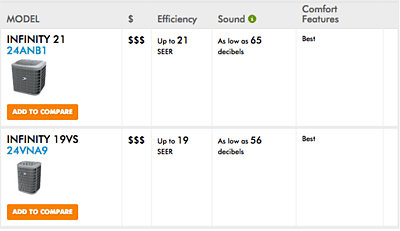How To Know Which Central Air Conditioner Is the Quietest
Looking for the quietest central air conditioner money can buy?
Then you need to look at an AC’s decibels (dB) rating, a unit used to measure the intensity of sound. The lower the decibel rating, the quieter the AC.
For example, on Carrier’s website you can see the quietest ACs by comparing their dB (sound) levels. The Infinity 19VS is quieter than the Infinity 21, as you can see from its lower dB level

Note: It says “as low as.” Which means it’s the lowest decibel level achieved from the quietest size within each model group during low fan-speed operation.
Finding the quietest air conditioners
Currently, the 50-60 dB range is as quiet as an air conditioner can get. As of 2015, some of the quietest ACs include:
- Carrier Infinity 19VS - 56 dB
- Dave Lennox Collection XC25 - 59 dB
- American Standard Platinum ZV - 55 dB
Understanding air conditioner sound levels
OK, so what do those numbers mean, though? How loud is 65 or 56 decibels? How will you know if the AC is quiet enough for you?
For a frame of reference, Purdue University’s Chemistry Department gives you examples of noise sources for each decibel level:
- 50 dB (1/4th as loud as 70 dB) - Quiet conversation at home
- 60 dB (1/2 as loud as 70 dB, fairly quiet) - Conversation at a restaurant
- 70 dB (upper 70s are annoyingly loud) - Running a vacuum cleaner
- 80 dB (twice as loud as 70 dB) - Running a garbage disposal
So, if you’re looking for a quiet AC, make sure it’s within 50 to 60 dB.
Finding features that reduce sound
If you can’t find an AC’s sound level, look for certain features that imply quietness, including:
- Variable speed fan — The indoor unit’s fan can operate at different speeds depending on your comfort needs. This improves comfort, lowers energy bills and, of course, lets the AC run at quieter speeds.
- Compressor insulation — A separate compartment or enclosure that covers the compressor to reduce the outdoor unit’s noise.
- Noise-reducing fan blades — A fan blade design designed to reduce the outdoor unit’s noise.
- Insulated base pan — An addition of a pan underneath the air conditioner designed to reduce noise and resist corrosion.
How AC size and fan speed affect sound levels
Remember that any sound rating you see implies two things:
- The size of the AC is the quietest size (probably a smaller size). Size is measured in “tons.”
- The AC's indoor fan is running at the lowest setting.
In other words, the advertised sound (dB) is the AC running under perfect conditions.
So, if you have a larger home (implying a larger AC) and live in a hotter area like Florida (implying that the fan will run at a higher setting) the AC you buy will probably be louder than advertised.
How do you know which AC size you need?
You’ll need to get a professional AC installer to perform a Manual J Heat Load Calculation on your home.
Most reputable HVAC companies will do this for you free of charge as part of an air conditioner installation estimate.
Nice, right? You’re free to choose the first offer you get or leave it to find someone else with no charge to you.
Related article: How Do I Know What Size Central Air Conditioner I Need for My Home?
Get a free AC installation estimate
Do you live in Florida and an AC installation? Contact Cool Today to schedule a free estimate.
Cool Today is a leading air conditioning company Florida that has been serving homeowners here since 1963. We have locations in Tampa, Orlando, Dunedin, Sarasota, and Naples. View our service area.
Posted in: Buyer's Guide